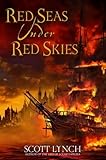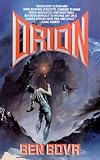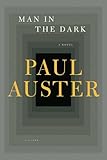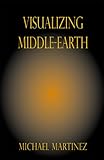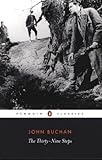With this I’ll be caught up for the year so far, but I’ve been toying with a few other book related entries. Why? Especially since so much of this rambling, slowly to never updated, blog has been so unfocused before? I think a set of ideas that I can write multiple times about works quite well for me, and gives some incentive to keep writing something.
So June. Good reading month. Weather was getting nicer, and I laid in bed till late many an evening reading with a cool night breeze.
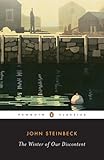 The Winter of our Discontent – John Steinbeck – Steinbeck is truly a great author. I been meaning to read more of him over the last couple of years, and now that I need to build up the library again, I decided to start the journey. Here, in a rare Steinbeck novel that takes place outside of California, is a great story of a man in a small, old coastal town. All he has left is his family name, which used to own much of the town. In a wonderful way, the man is an unreliable narrator, who you can see struggle with his lot in life and the decisions he must make, but comes up with a plan to change it all. He only gives you clues and little peeks into what he’s planning and this leads you deeper into the story, not knowing exactly what he’s planning. It’s got a few of the traditional tragic parts of a Steinbeck story, but it’s a wonderful read and I look forward to my Steinbeck quest now.
The Winter of our Discontent – John Steinbeck – Steinbeck is truly a great author. I been meaning to read more of him over the last couple of years, and now that I need to build up the library again, I decided to start the journey. Here, in a rare Steinbeck novel that takes place outside of California, is a great story of a man in a small, old coastal town. All he has left is his family name, which used to own much of the town. In a wonderful way, the man is an unreliable narrator, who you can see struggle with his lot in life and the decisions he must make, but comes up with a plan to change it all. He only gives you clues and little peeks into what he’s planning and this leads you deeper into the story, not knowing exactly what he’s planning. It’s got a few of the traditional tragic parts of a Steinbeck story, but it’s a wonderful read and I look forward to my Steinbeck quest now.
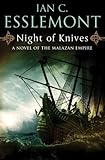 Night of Knives – Ian C. Esselmont – Here’s another by Esselmont set in the Malazan world, taking place in a single night, it’s the story of an assassination and take over of the empire through nefarious means. It’s really great that Esselmont is taking his opportunity to write books that are set within the same world and time line of those by Erikson, but covering stories that were glossed over or only mentioned in passing. It gives the world so much more of a lived in feel, and a great sense of history and place. I love the world building that some of these types of series do, but Erikson and Esselmont go above and beyond the efforts of so many that came before them.
Night of Knives – Ian C. Esselmont – Here’s another by Esselmont set in the Malazan world, taking place in a single night, it’s the story of an assassination and take over of the empire through nefarious means. It’s really great that Esselmont is taking his opportunity to write books that are set within the same world and time line of those by Erikson, but covering stories that were glossed over or only mentioned in passing. It gives the world so much more of a lived in feel, and a great sense of history and place. I love the world building that some of these types of series do, but Erikson and Esselmont go above and beyond the efforts of so many that came before them.
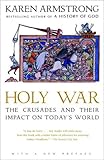 Holy War: The Crusades and Their Impact on Today’s World – Karen Armstrong – Long title, but great book! The Crusades were one of the many holes in my sense of history. They are constantly referenced, and the term “on a crusade” has many strong connotations in the modern world, but I knew nothing other than early Christians decided it was a great idea to “liberate” the holy land. Armstrong takes an incredibly fascinating look at the history of the crusades, but also much of the more modern history and how so much of the misguided pre-conceptions and prejudice the West and the Arab culture have of each other come from ideas and policies of the Crusades. She does a wonderful job of trying to remain neutral through her histories of the three cultures at work in the Middle East. Each has made colossal mistakes and misjudgments of each other, and through this all so much destruction and needless death, but she presents it fairly and with very little judgment. If this period in history even somewhat interests you, this book is worth a look.
Holy War: The Crusades and Their Impact on Today’s World – Karen Armstrong – Long title, but great book! The Crusades were one of the many holes in my sense of history. They are constantly referenced, and the term “on a crusade” has many strong connotations in the modern world, but I knew nothing other than early Christians decided it was a great idea to “liberate” the holy land. Armstrong takes an incredibly fascinating look at the history of the crusades, but also much of the more modern history and how so much of the misguided pre-conceptions and prejudice the West and the Arab culture have of each other come from ideas and policies of the Crusades. She does a wonderful job of trying to remain neutral through her histories of the three cultures at work in the Middle East. Each has made colossal mistakes and misjudgments of each other, and through this all so much destruction and needless death, but she presents it fairly and with very little judgment. If this period in history even somewhat interests you, this book is worth a look.
So goes June.
